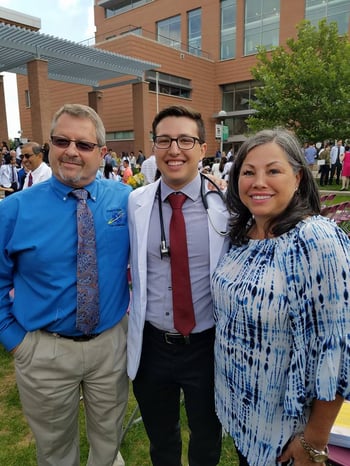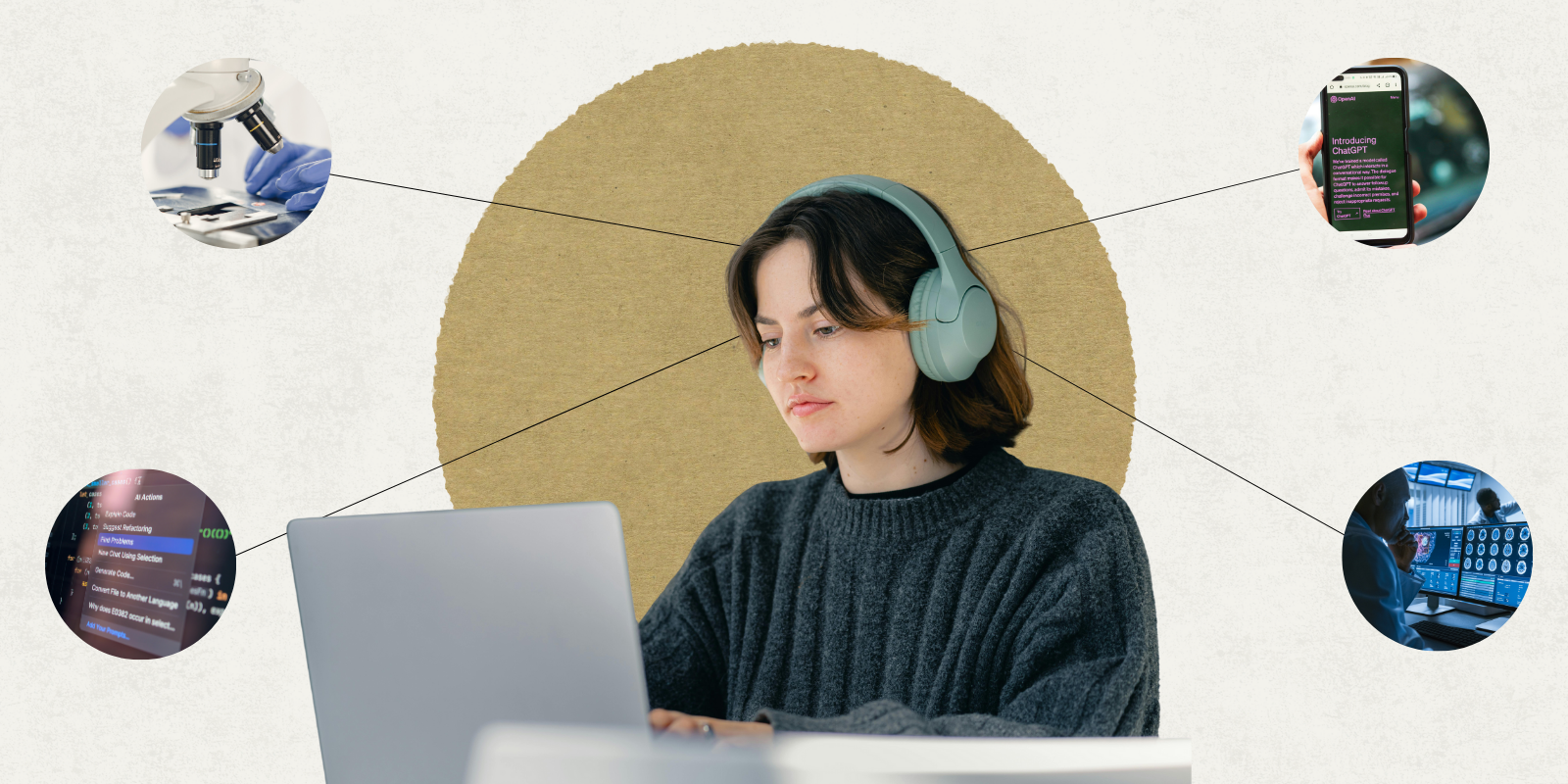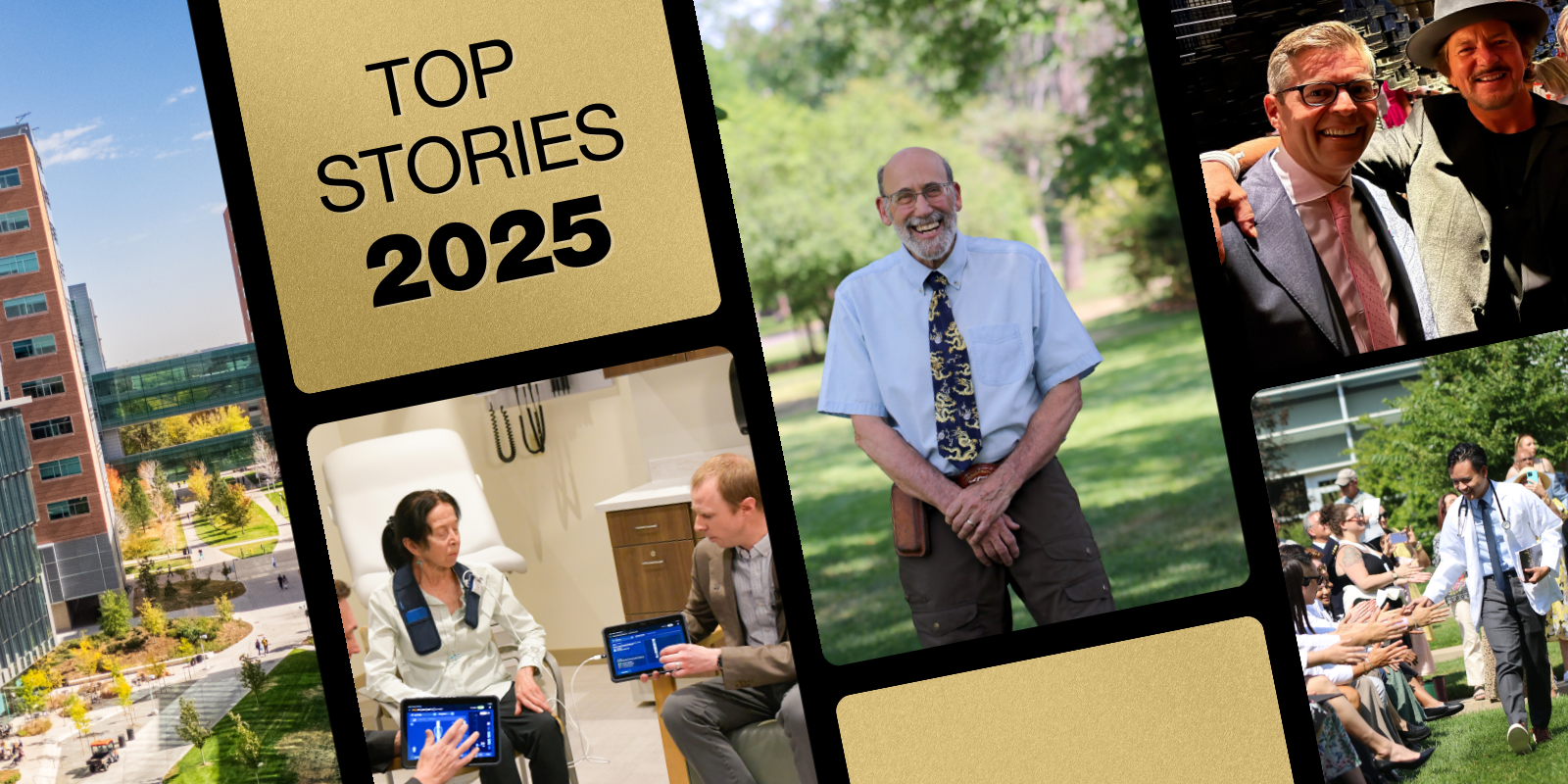With Match Day approaching, Michael Levy is looking forward to finding out where he will spend the next four years during his residency. Michael came to the University of Colorado School of Medicine after earning his undergraduate degree in human biology from Stanford University. He was drawn to the opportunity to help reform the medical school curriculum and help those most in need of care. We sat down with Levy to find out why he went into medicine and what he hopes to accomplish in the future.
What sparked your interest in medicine?
Growing up in Albuquerque, New Mexico, my dad was an ER doctor and my mom was a nurse. So I had a lot of exposure to medicine growing up. I think some of the most impactful things for me were watching my mom volunteer as a school nurse when they needed someone to fill in and hearing my dad tell me stories about his work in areas of need around New Mexico.
Michael Levy and his parents
How do your parents feel about you following in their footsteps?
They've always been super-proud of me. Now that I've done clinical work, I feel like I can really relate to them and the joy they got being in this position where you're able to help other people. It makes me feel like I'm living up to the examples that they set, and I hope that they feel similarly.
What made you choose the University of Colorado for medical school?
When I was applying, they had just started the curriculum reform process. I did a couple years of teaching before starting med school and was always interested in being involved in education. I got a call from Dean Zehnder [Nichole Zehnder, MD, former assistant dean of admissions and student affairs at the School of Medicine] saying that it was an interesting time for the school and that CU would be a great place to come if I was interested in medical education. It worked out perfectly that I've been able to be on a lot of reform committees and have had a say in some of the things that are happening in our new curriculum. Another thing was the diversity in the patient population, especially with the safety net hospital here. And I knew Denver was a welcoming city and a place where I could experience all the great things about living in a city and be able to get outdoors as well.
What is your area of specialty and why did you choose it?
I chose internal medicine, and I am specifically interested in primary care. In terms of the patient population, I knew I wanted to work with adults — likely adults in a safety net setting — and one of the big areas of need for them is primary care. I also had a lot of great mentors in this field. One was Jennifer Adams, MD, director of the Denver Health Longitudinal Integrated Clerkship (LIC) and assistant professor of internal medicine. I also had some experience working in the outpatient clinic at Denver Health with Vishnu Kulasekaran, MD, the assistant director of the LIC and assistant professor of internal medicine. They showed me that outpatient primary care is a way you can get to know your patients’ stories and meet them where they're at. For instance, a lot of the patients I saw this past year had a substance use disorder and came to clinic to get Suboxone to treat their use disorder. The whole premise of these treatments is to minimize the harm that using drugs can do to someone and to make sure that we can help them achieve the goals they have in life. That was such a special experience.
You’ve mentioned safety net settings a couple of times — can you explain what that means and why it’s important to you?
There's a large percentage of the population that only seeks care when they absolutely need it. This can be individuals who feel distrustful of the system, who don't have the funds, who are undocumented, or who don't speak English as a first language. Safety net clinics and hospitals are specifically designed to serve those populations, and the biggest hospital system here is Denver Health. These institutions are mission driven, with the intention that we will help anybody and everybody, no matter their background or the language they speak or their insurance status. Everyone deserves to have the same level of care. I’ve done most of my clinical work at Denver Health, and I think it’s something that everyone who works there feels.
What were you looking for as you interviewed for your residency?
I had a few things I was looking for in a residency program. One was being able to work in a setting with an emphasis on the value of primary care. Also, throughout my medical school career, I've done a lot of work in diversity and inclusion, specifically around biases that may get perpetuated through our curriculum. I wanted a place that not only was interested in reducing bias in medicine, but that was already doing this kind of work and being thoughtful about the way they interacted with marginalized and minority populations. The third thing is I just wanted a place where I could continue to work in a safety net setting. And finally, I wanted a place that was excited about education. For me, doing the job of medicine itself is incredibly rewarding, but being able to teach somebody else and help them find the same joy and success — I think that's a way you can amplify your impact on the world. So it was important to me to find a place that would continue to foster my growth as an educator.
How are you feeling about Match Day coming up? Are you nervous or excited?
You know, I think it's a little bit of both. It’s certainly exciting to look toward the future and see all these possibilities, whether that's staying here at CU or going elsewhere and meeting new mentors. If I do end up leaving Colorado, I'll be sad, because I've had this whole career here. It's been challenging, but it's also been so impactful on my life. This year, I’ve worked on the admissions committee, so as I've been talking to future students it's a constant reminder of how privileged I am to be in this position and how grateful I feel to people like my mentors, to the school itself, and to everybody who has allowed me to care for patients and add value here.
Levy matched with UC San Francisco (UCSF) Internal Medicine Residency Program in the UCSF Primary Care General Internal Medicine Track.




